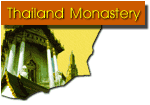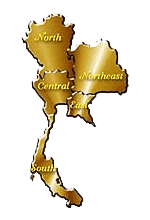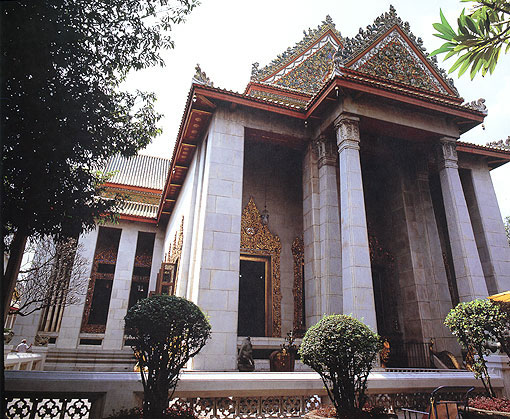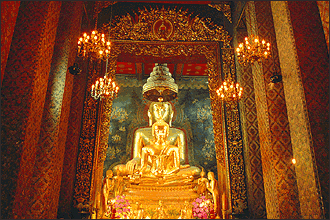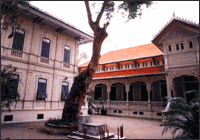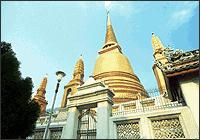|
Wat Bowornniwet Vihara
Rajaworavihara ( Wat Boworn )
is situated near the Wan Chart Bridge and Banglamphoo Market. Prince
Mahasakdipolsep, vice-king of the Third Reign, ordered the construction
of this temple along with Wat Rangsisuthawas and it was built between
1824 to1832. At first the temple was called Wat Mai, but when king
Rama III invited the future King Rama IV, who was then a monk, to
be abbot of the temple , the name was changed to Wat Bowornniwet
Vihara. In the Six Reign Wat Rangsisuthawas, which was in poor condition,
was incorporated into Wat Bowornniwet Vihara. Wat Boworn is the
residence of members of the royal family who enter the monkhood.
It has been the residence of many the supreme patriarchs of the
Buddhist Church in Thailand, and it is the site of Mahamakut Rajavittayalai,
Thailand's first Buddhist institution of the high education.
Because the temple was built during
the Third Reign, it was many examples of Chinese art, such as phra
ubosot, vihara keng, vihara Phra Sassada and the door of phra ubosot
where the Chinese deity " Siew Kang " is carved on the
walls as a guardian spirit.
The phra ubosot there are murals
that are the work of Khrua In Khong. Of special interest are the
painting above the windows illustrating Dhamma teachings using European
figures and scenes. The murals also employed perspective as in Western
style paintings. There are two presiding Buddha images in the phra
ubosot , namely Phra Suwannakhet or Luang Pho To, and Phra Buddha
Chinasi, which was brought down from Phitsanulok.
In the monastic area there are important
buildings such as the Phra Panya-a three story European - style
building where King Rama IV resided when he was a monk, the Tamnak
Phetch, built in the Sixth Reign, the lower floor of which is now
used for gatherings of Buddhist monks and which also houses a life-size
standing statue of King Rama IV, and another important building
is the Phor Por Ror Building that houses a museum where provide
the birth-death knowledge . Phad-yod etc.
|
